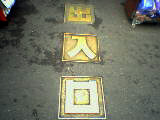山村訓長但知覓
The Sanchon Hunjang(usually clicking on the photos yields an enlarged version)
3/23/2006
Oops
So you build a new building. Right in the middle of 남대문시장--sorry, I meant 숭례문시장. It looks nice and sparkly. This new building is sure to garner you a mint. Well, if you can get shoppers to come in and peruse the merchandise of the sellers, who you are gouging for 자리세, then it will.
Brilliant brainstorm! If you have some beautiful brass letters made to announce where people can enter/exit the building and have them installed in the street, surely the people will come in droves, no? And since 숭례문시장 is so popular among the Japanese tourists, best make the sign in 한자.
Beautiful. You're sure to make a mint!
'cept you got screwed, aesthetically speaking, when those minimum wage laborers installed your sign:

Surely they wouldn't have made it " "? Or would they...?
"? Or would they...?
Brilliant brainstorm! If you have some beautiful brass letters made to announce where people can enter/exit the building and have them installed in the street, surely the people will come in droves, no? And since 숭례문시장 is so popular among the Japanese tourists, best make the sign in 한자.
Beautiful. You're sure to make a mint!
'cept you got screwed, aesthetically speaking, when those minimum wage laborers installed your sign:

Surely they wouldn't have made it "
 "? Or would they...?
"? Or would they...?3/06/2006
They're making a comeback
On the subway there was this intriguing advertisement for one of those tonics that is supposed to help you not become as intoxicated by all of the alcohol you are bound to ingest at a typical 회식. A "morning after" tonic of a different ilk, if you will.

The thing that caught my eye about this advertisement is that it used 4 사자성어 (actually 2 사자 성어, one famous saying and one quote from a poem if you want to get picky), which had each been changed a bit, in its marketing. I'm not sure how effective this approach is, but it's always guaranteed to catch the eye of the Sanchon Hunjang.
Not especially erudite changes, but given the fact that they are trying to appeal to Everyman, the whole thing strikes me as a bit high-brow. After years of all of the kids saying "I hate 한문 class most of all," maybe 한자 are becoming fashionable again. Maybe it's time to take leave of this 속세 and start my own 서원!

The thing that caught my eye about this advertisement is that it used 4 사자성어 (actually 2 사자 성어, one famous saying and one quote from a poem if you want to get picky), which had each been changed a bit, in its marketing. I'm not sure how effective this approach is, but it's always guaranteed to catch the eye of the Sanchon Hunjang.
- Top Left: 三遷之敎 (the teachings of moving thrice) from 孟母三遷之敎 (Mencius' mother's teaching by moving three times, referring to the story of how Mencius started out life by a graveyard, but when he started mimicking the mourners in his play, his mom moved to a market. Then he started copying the traders, so finally she moved near a schoolyard and was happy when he picked up proper scholarly habits.) becomes the 三遷之交 ([social] exchange of moving three times)--they're all going to 삼차 tonight!

- Bottom Left: 성삼문's famous rebuke in the form of a 시조 on those who were less than faithful to the deposed boy king 단종, 이 몸이 주거 가서 무어시 될고 하니 What will this body become, when it has died?/ 蓬萊山 第一峯에 落落長松 되야 이셔 A tall pine with drooping boughs on the highest peak of Mount Penglai/ 白雪이 滿乾坤할 제 獨也靑靑하리라 That when the white snows fill heaven and earth, I alone shall be green, becomes 獨夜淸淸 (during the night, I alone will be fresh and clear).

- Top Right: 旭日昇天 (the morning sun ascends the heavens) , a symbol for rising power that was especially popular during the times of the Japanese Empire becomes 旭日勝天 (the morning sun defeats the heavens), which clearly(?) refers to the ability of one who has imbibed this elixir to rise early the next morning, in spite of all of the 폭탄주 s/he has downed.

- Bottom Right: 口尙乳臭 (the mouth still reeks of [mamma's] milk) becomes 口尙有醉 (the mouth still has drunkenness, which, they kindly explain, refers to the remnants of last night's revelry still in the mouth).

Not especially erudite changes, but given the fact that they are trying to appeal to Everyman, the whole thing strikes me as a bit high-brow. After years of all of the kids saying "I hate 한문 class most of all," maybe 한자 are becoming fashionable again. Maybe it's time to take leave of this 속세 and start my own 서원!
3/01/2006
Every little word is magic
Stolen directly from 서거정(1420-1488)'s 《東人詩話 동인시화》 with no input by the Sanchon Hunjang. ^^ Don't worry about my plagiarism. 서거정 lifted the introductory episode directly from 歐陽修 구양수(1007-1072)'s 《六一詩話 육일시화 [Mr.] One-of-six's Poetry Talks》.
舍人 陳從易 사인 진종역 of the Song Dynasty was reading a collection of poetry by uber famous Tang poet 杜甫 두보. Unfortunately, 사인선생 had picked his book up on the cheap at one of those book warehouse clearance sales and there was a big smear where a word used to be. What he still could read went like this:
사 인선생 was very curious what word belonged in this space. He tried looking through from the back of the page and every other trick he could think of to get a hint as to what the word was supposed to be. All to no avail. Since the lines had to be parallel, it gave him room to start guessing words that would fit in the gap. If he could find the one word that fit the best, presumably this would have been the word that the master of poetry, 두보, would have used. Finding the missing character became a bit of an obsession and he called his friends over to play his guess-the-missing-word game. They tried "is swift 疾," "falls 落," "rises 起" and "descends 下," all without success.
Give their little game a try yourself. What do you think goes in the blank?
Later 사인선생 came across a good copy of the same book with clear printing. He thumbed to the page...
and discovered...
that...
the right answer was...
"passes by 過."
東坡 동파 蘇軾 소식 once wrote a poem about a sick crane that included the line
Then one day he covered up the word 閣, so it read "Three-foot long shins ????? a skinny body" and had 任德 임덕 guess what the word was. 임 was unable to guess the hidden word. 동파선생 slowly uncovered it and showed him that the right word was "topped by 閣."
☞ 任: 맡길 임, 德: 덕 덕.
As you can see, each individual word in a poem is agonized over at length by the poet and his/her commenters. This has implications for glib translators who just rush through, not bothering to analyze why the original poet may have selected a specific word over its rivals. If the original poet put that much care and thought into the original, doesn't the professional translator owe a bit more in faithfulness to the text?
☞ 東: 동녘 동, 人: 사람 인, 詩: 시 시, 話: 말씀 화, 歐: 게워낼 구, 陽: 볕 양, 修: 닦을 수, 六: 여섯 륙, 一: 한 일.
舍人 陳從易 사인 진종역 of the Song Dynasty was reading a collection of poetry by uber famous Tang poet 杜甫 두보. Unfortunately, 사인선생 had picked his book up on the cheap at one of those book warehouse clearance sales and there was a big smear where a word used to be. What he still could read went like this:
☞ 舍: 집 사, 陳: 늘어놓을 진, 從: 따를 종, 易: 바꿀 역, 杜: 막을 두, 甫: 겨우 보.
身輕一鳥■, Body light, one bird [SMUDGE];
槍急萬人呼! Spears quick, ten thousand people shout!
☞ 身: 몸 신, 輕: 가벼울 경, 一: 한 일, 鳥: 새 조, ■: smudge 네모,
槍: 무기 창, 急: 급할 급, 萬: 일만 만, 呼: 부를 호.
사 인선생 was very curious what word belonged in this space. He tried looking through from the back of the page and every other trick he could think of to get a hint as to what the word was supposed to be. All to no avail. Since the lines had to be parallel, it gave him room to start guessing words that would fit in the gap. If he could find the one word that fit the best, presumably this would have been the word that the master of poetry, 두보, would have used. Finding the missing character became a bit of an obsession and he called his friends over to play his guess-the-missing-word game. They tried "is swift 疾," "falls 落," "rises 起" and "descends 下," all without success.
☞ 疾: 병 질, 落: 떨어질 락, 起: 일어날 기, 下: 아래 하.
Give their little game a try yourself. What do you think goes in the blank?
Later 사인선생 came across a good copy of the same book with clear printing. He thumbed to the page...
and discovered...
that...
the right answer was...
"passes by 過."
☞ 過: 지날 과.
東坡 동파 蘇軾 소식 once wrote a poem about a sick crane that included the line
三尺長脛閣瘦軀 Three-foot long shins topped by a skinny body
☞ 三: 석 삼, 尺: 자 척, 長: 길 장, 脛: 정강이 경, 閣: 문설주 각, 瘦: 파리할 수, 軀: 몸 구.
Then one day he covered up the word 閣, so it read "Three-foot long shins ????? a skinny body" and had 任德 임덕 guess what the word was. 임 was unable to guess the hidden word. 동파선생 slowly uncovered it and showed him that the right word was "topped by 閣."
☞ 任: 맡길 임, 德: 덕 덕.
As you can see, each individual word in a poem is agonized over at length by the poet and his/her commenters. This has implications for glib translators who just rush through, not bothering to analyze why the original poet may have selected a specific word over its rivals. If the original poet put that much care and thought into the original, doesn't the professional translator owe a bit more in faithfulness to the text?
Archives
7월 2005 8월 2005 9월 2005 10월 2005 11월 2005 12월 2005 1월 2006 2월 2006 3월 2006 7월 2006 8월 2006 10월 2006 4월 2007 5월 2007 6월 2007 7월 2007 8월 2007 9월 2007 10월 2007 11월 2007 12월 2007 1월 2008 5월 2008 8월 2008